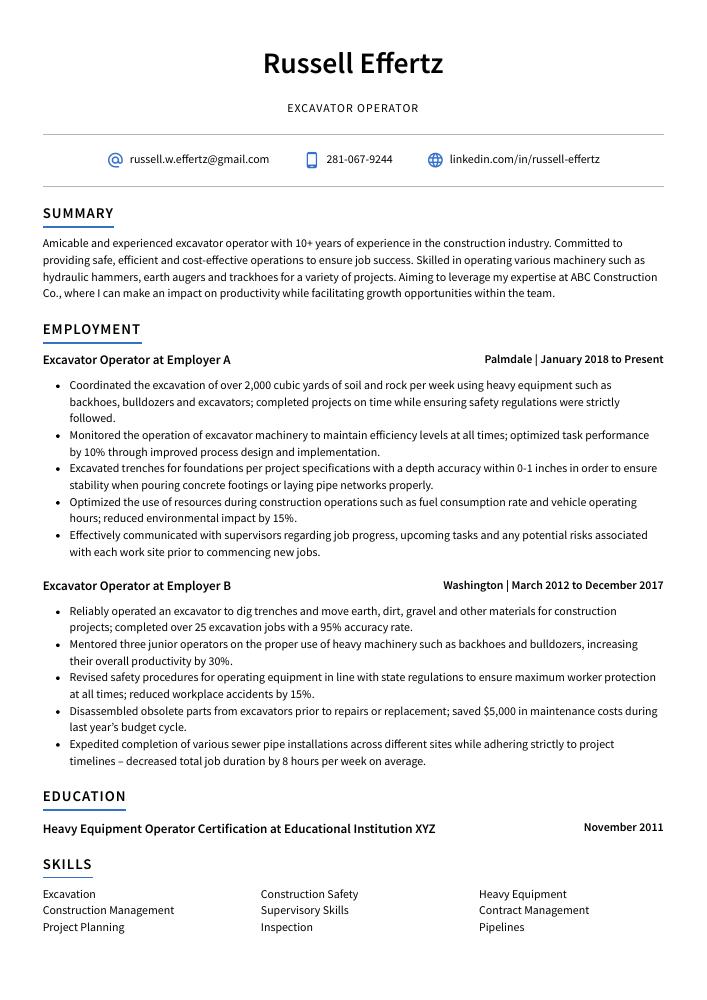Excavator Operator Resume Guide
Excavator operators use heavy machinery to dig trenches, holes, and foundations. They are responsible for operating the excavator in a safe and efficient manner while ensuring that all safety regulations are followed. They must also inspect the machine regularly to ensure it is working properly.
You have the experience and know-how to operate heavy machinery like an excavator, but potential employers don’t know about your qualifications. To demonstrate why you’re the perfect candidate for the job, you must write a resume that stands out from the competition.
This guide will walk you through the entire process of creating a top-notch resume. We first show you a complete example and then break down what each resume section should look like.
Table of Contents
The guide is divided into sections for your convenience. You can read it from beginning to end or use the table of contents below to jump to a specific part.
Excavator Operator Resume Sample
Russell Effertz
Excavator Operator
[email protected]
281-067-9244
linkedin.com/in/russell-effertz
Summary
Amicable and experienced excavator operator with 10+ years of experience in the construction industry. Committed to providing safe, efficient and cost-effective operations to ensure job success. Skilled in operating various machinery such as hydraulic hammers, earth augers and trackhoes for a variety of projects. Aiming to leverage my expertise at ABC Construction Co., where I can make an impact on productivity while facilitating growth opportunities within the team.
Experience
Excavator Operator, Employer A
Palmdale, Jan 2018 – Present
- Coordinated the excavation of over 2,000 cubic yards of soil and rock per week using heavy equipment such as backhoes, bulldozers and excavators; completed projects on time while ensuring safety regulations were strictly followed.
- Monitored the operation of excavator machinery to maintain efficiency levels at all times; optimized task performance by 10% through improved process design and implementation.
- Excavated trenches for foundations per project specifications with a depth accuracy within 0-1 inches in order to ensure stability when pouring concrete footings or laying pipe networks properly.
- Optimized the use of resources during construction operations such as fuel consumption rate and vehicle operating hours; reduced environmental impact by 15%.
- Effectively communicated with supervisors regarding job progress, upcoming tasks and any potential risks associated with each work site prior to commencing new jobs.
Excavator Operator, Employer B
Washington, Mar 2012 – Dec 2017
- Reliably operated an excavator to dig trenches and move earth, dirt, gravel and other materials for construction projects; completed over 25 excavation jobs with a 95% accuracy rate.
- Mentored three junior operators on the proper use of heavy machinery such as backhoes and bulldozers, increasing their overall productivity by 30%.
- Revised safety procedures for operating equipment in line with state regulations to ensure maximum worker protection at all times; reduced workplace accidents by 15%.
- Disassembled obsolete parts from excavators prior to repairs or replacement; saved $5,000 in maintenance costs during last year’s budget cycle.
- Expedited completion of various sewer pipe installations across different sites while adhering strictly to project timelines – decreased total job duration by 8 hours per week on average.
Skills
- Excavation
- Construction Safety
- Heavy Equipment
- Construction Management
- Supervisory Skills
- Contract Management
- Project Planning
- Inspection
- Pipelines
Education
Heavy Equipment Operator Certification
Educational Institution XYZ
Nov 2011
Certifications
National Commission for the Certification of Crane Operators (NCCCO)
May 2017
1. Summary / Objective
A resume summary/objective is the first thing a potential employer will read, so it’s important to make sure you get their attention. As an excavator operator, your summary should highlight your experience and skills in operating heavy machinery safely and efficiently. You could also mention any certifications or licenses you have obtained that are relevant to the job, as well as how many years of experience you have in this field.
Below are some resume summary examples:
Hard-working, safety-oriented excavator operator with 5+ years of experience in operation and maintenance. At XYZ, operated a variety of heavy machinery such as backhoes, bulldozers, wheel loaders, and skid steers to dig trenches for foundations or utilities. Demonstrated expertise in operating equipment safely while maintaining high production standards. Adept at reading blueprints and other technical documents to ensure accurate excavation operations.
Reliable and experienced excavator operator with 8+ years of experience operating heavy machinery in a variety of tasks from earthworks to demolition. Seeking new challenge at ABC Construction where I can utilize my expertise in safety protocols, proficient use of GPS systems, and ability to read blueprints accurately. Key achievements include completing two major projects ahead of schedule while consistently meeting high standards for quality control.
Professional excavator operator with 10+ years of experience in the construction industry. Skilled at operating a variety of machinery, including excavators and bulldozers for both residential and commercial projects. Able to work efficiently under tight deadlines while adhering to safety protocols. Received numerous commendations from supervisors for completing job sites ahead of schedule without sacrificing quality or safety standards.
Well-rounded excavator operator with 10+ years of experience in the construction industry. At XYZ, operated and maintained heavy machinery for a range of excavation projects. Proven track record of staying ahead on schedule while ensuring safety protocols are followed at all times. Seeking to use my expertise in excavations and equipment operations to take ABC Construction Co.’s efficiency up another notch.
Dependable excavator operator with 10+ years of experience in earthmoving, demolition and excavation operations. At XYZ Construction Inc., operated an 85-ton excavator to perform tasks such as digging trenches, moving heavy materials and removing debris from construction sites. Highly skilled at operating the machine within safety regulations while maintaining high productivity standards.
Determined excavator operator with 5+ years of experience in residential and commercial demolition. Expertly operated a variety of heavy equipment, including backhoes, bulldozers, and excavators for ABC Corp. Responsible for safe operation while adhering to all safety protocols and regulations. Seeking to leverage my knowledge as an excavator operator at XYZ Construction Co., Inc.
Proficient excavator operator with 8+ years of experience operating heavy machinery to move earth, rock, and other materials. Seeking a role at ABC Construction Company where I can use my strong technical skills in excavation operations combined with safety awareness and attention to detail. Achieved an exemplary safety record of zero accidents/incidents throughout career.
Skilled excavator operator with 5+ years of experience operating heavy machinery in a safe and efficient manner. Experienced in digging trenches, foundations, and other areas for construction sites. Seeking to join ABC Construction as an excavator operator where I can utilize my skillset to help build high-quality projects on time.
2. Experience / Employment
The employment (or experience) section is where you provide details on your work history. This should be written in reverse chronological order, meaning the most recent job is listed first.
You want to use bullet points for this section; it makes it easier for the reader to take in what you have to say quickly and accurately. When writing out the bullet points, make sure that they are detailed enough so that they explain what tasks were done and any results achieved from them.
For example, instead of saying “Operated an excavator,” you could say, “Successfully operated a 20-ton excavator with precision accuracy while digging trenches at construction sites.”
To write effective bullet points, begin with a strong verb or adverb. Industry specific verbs to use are:
- Operated
- Loaded
- Dug
- Transported
- Excavated
- Leveled
- Inspected
- Adjusted
- Repaired
- Assembled
- Disassembled
- Greased
- Monitored
- Tested
- Troubleshot
Other general verbs you can use are:
- Achieved
- Advised
- Assessed
- Compiled
- Coordinated
- Demonstrated
- Developed
- Expedited
- Facilitated
- Formulated
- Improved
- Introduced
- Mentored
- Optimized
- Participated
- Prepared
- Presented
- Reduced
- Reorganized
- Represented
- Revised
- Spearheaded
- Streamlined
- Structured
- Utilized
Below are some example bullet points:
- Resourcefully operated an excavator to dig trenches for laying down pipes, cables and other utilities on job sites; completed projects 2 weeks ahead of schedule.
- Developed a streamlined process for unloading the excavator from flatbed trucks, reducing setup time by 15%.
- Represented the company at community meetings with local politicians and residents regarding upcoming construction projects; secured approval for 4 major developments within 6 months.
- Assembled attachments such as buckets, power rakes & blades on the excavators according to task specifications in just 60 minutes or less per machine per day.
- Assessed job sites before operations commenced and identified potential safety hazards quickly; prevented up to 30% of workplace accidents through proactive measures taken over 3 years period.
- Demonstrated proficiency in operating an excavator to dig trenches, foundations and footings; operated equipment for over 40 hours a week with no safety incidences.
- Achieved daily quota of 120 cubic yards of excavation works within 8-hour shifts while maintaining quality standards according to industrial specifications.
- Greased, inspected and maintained the excavator on a regular basis, ensuring that all parts were functioning optimally before each shift commenced.
- Operated various types of heavy construction machinery such as bulldozers, skid steers & backhoes in coordination with other operators for successful completion of projects ahead of schedule by 10%.
- Meticulously followed instructions from project managers regarding where/how much was required to be dug out or moved at any given time without compromising worker safety regulations.
- Streamlined excavation operations by operating backhoes, excavators and bulldozers to dig trenches for pipes, footings and foundations; increased productivity rate by 25%.
- Repaired heavy equipment regularly using hand tools, power tools and welding machines; reduced downtime hours of machinery by 15% in a six-month period.
- Loaded soil into dump trucks efficiently while adhering to all safety protocols related to hauling materials from the site; improved loading times per truckload significantly.
- Efficiently operated hoisting devices such as cranes or winches when lifting boulders or large rocks out of the excavation area with minimal risk of damage or injury onsite.
- Utilized GPS technology when surveying land areas prior to digging so that projects could be completed accurately within timeframes set forth; saved an average $500/project due to precise measurements taken at the onset of each job assignment.
- Inspected excavation equipment on a daily basis, ensuring that all components were in working order and catching minor defects before they could develop into major problems; prevented downtime by 20%.
- Thoroughly followed safety protocols when operating heavy machinery; created and enforced a comprehensive set of guidelines which reduced incidents by 15%.
- Improved excavation efficiency through the use of advanced GPS technology, resulting in an 11% reduction in fuel costs over 6 months.
- Structured work schedules to ensure timely completion of projects while maintaining quality standards throughout every stage of the process; completed 3 large-scale excavations within budgeted timeframe and under projected cost estimates.
- Troubleshot technical issues with machines as well as software errors for automated systems such as diggers, bulldozers and loaders; decreased repair time from 2 hours to 1 hour per issue on average.
- Transported excavation materials and equipment to different job sites, efficiently managing a fleet of 10 excavators with an average load capacity of 15 tons.
- Actively monitored the excavation process while operating heavy machinery; advised crew members on safety protocols and best practices when working around hazardous areas.
- Spearheaded various projects including road construction, utility line installation, land contouring and riverbank restoration; completed tasks within timeline targets by 30%.
- Reduced operational costs through effective maintenance & repair processes for all large-scale excavator units in inventory; identified potential issues before breakdowns occurred resulting in increased productivity levels by 40%.
- Successfully operated multiple types of power shovels such as backhoes, draglines and clamshell buckets during site preparation operations without compromising quality standards or timelines set forth by project managers.
- Adjusted excavators of various sizes to dig trenches and move materials such as dirt, rock, gravel for the construction of pipelines and roads; delivered projects on time with no safety incidents.
- Tested mechanical components and hydraulic systems of excavators before each shift to ensure operational efficiency; completed daily maintenance checks & repairs that reduced downtime by 15%.
- Confidently operated heavy equipment in difficult terrain while adhering to all safety regulations outlined by OSHA standards; improved job site performance by 10%, resulting in a $75K cost savings over 6 months.
- Presented project updates at weekly team meetings with supervisors, contractors & other stakeholders via effective verbal communication skills; enabled teams to stay up-to-date on progress towards completion goals within budget restrictions.
- Reorganized storage areas for spare parts used in the repair and maintenance of excavator machines according to industry best practices guidelines; achieved an 85% increase in inventory accuracy levels within 3 weeks from implementation date.
- Compiled and drove a wide range of excavator machinery to complete earthworks projects on time and within budget, increasing project efficiency by 15%.
- Dug trenches for plumbing, electrical lines and other infrastructure needs with precision; demolished outdated structures safely using the correct tools.
- Formulated safe work plans according to job requirements that ensured all safety protocols were followed at all times; trained 3 team members in proper excavation techniques & use of equipment.
- Diligently operated an Excavator over 10 hours a day for various construction sites, moving more than 1 million cubic yards of soil while minimizing environmental impact on surrounding areas through careful planning & execution of operations tasks.
- Prepared surfaces prior to concrete pouring or asphalt laying processes by properly grading land and removing debris from site per customer specifications; completed 5 large-scale excavation jobs without any accidents or major incidents reported during tenure as operator.
- Facilitated the excavation of soil and other materials in over 500 construction sites, ensuring that each job was completed within an agreed timeline and budget.
- Leveled the ground for grading projects with precision; decreased project time by 20% through efficient operation of excavators, backhoes and bulldozers.
- Introduced new safety protocols to reduce accidents on-site among workers; successfully reduced injury rates from 5% to 1%.
- Participated in weekly maintenance routines for all types of heavy equipment used on site; increased life expectancy by 30%.
- Accurately operated machinery such as drill rigs, trenchers and dump trucks carrying up to 10 tons daily; achieved a 100% success rate without any major incidents or delays caused by machine malfunctioning/failure.
3. Skills
The skillset employers require in an employee will likely vary, either slightly or significantly; skimming through their job adverts is the best way to determine what each is looking for. One organization might require the operator to be able to drive a variety of excavators and another might need them to have experience with specific types.
As such, you want to tailor the skills section of your resume for each job that you are applying for. This is especially important in light of applicant tracking systems (ATS), which scan resumes for certain keywords before passing them on to human recruiters.
You should also discuss these skills further in other sections, such as the summary or work experience areas – this will help demonstrate how they can benefit an employer if hired.
Below is a list of common skills & terms:
- Civil Engineering
- Concrete
- Construction Management
- Construction Safety
- Contract Management
- Contractors
- Drainage
- Earthworks
- Excavation
- Factory
- Gas
- Heavy Equipment
- Inspection
- Mining
- Petroleum
- Pipelines
- Process Scheduler
- Project Planning
- Road
- Safety Management Systems
- Subcontracting
- Supervisory Skills
4. Education
Including an education section on your resume will depend on how far along you are in your career. If you just graduated and have no work experience, mention your education below your resume objective. However, if you have been working as an excavator operator for years with plenty of responsibilities to showcase, omitting the education section is perfectly fine.
If an education section is included, try to mention courses and subjects related to the excavator operator role that demonstrate skill sets necessary for success in this position such as heavy equipment operation or safety practices.
Heavy Equipment Operator Certification
Educational Institution XYZ
Nov 2011
5. Certifications
Certifications demonstrate to potential employers that you have the knowledge and skills required for a particular job. They are also proof of your commitment to professional development, as they require dedication and hard work in order to obtain them.
Including certifications on your resume will help you stand out from other applicants by showing hiring managers that you possess specific qualifications related to the position. This can be especially beneficial if there is an industry-specific certification mentioned in the job description.
National Commission for the Certification of Crane Operators (NCCCO)
May 2017
6. Contact Info
Your name should be the first thing a reader sees when viewing your resume, so ensure its positioning is prominent. Your phone number should be written in the most commonly used format in your country/city/state, and your email address should be professional.
You can also choose to include a link to your LinkedIn profile, personal website, or other online platforms relevant to your industry.
Finally, name your resume file appropriately to help hiring managers; for Russell Effertz, this would be Russell-Effertz-resume.pdf or Russell-Effertz-resume.docx.
7. Cover Letter
Including a cover letter with your job application is a great way to make yourself stand out from the competition. It’s typically made up of 2 to 4 paragraphs and provides recruiters with insight into who you are, why you’re applying for the role and what makes you an ideal fit.
Cover letters can be used as an opportunity to show off your personality, demonstrate enthusiasm in wanting the job and explain any gaps or shortcomings that may appear on your resume. Ultimately, it gives hiring managers a more complete picture of who you are as a professional – so don’t miss this chance!
Below is an example cover letter:
Dear Trystan,
I am writing to apply for the position of Excavator Operator at your construction company. With more than 10 years of experience operating excavators, I am confident I will make a valuable contribution to your team.
In my previous role as an excavator operator at ABC Construction, I was responsible for operating and maintaining a variety of excavators while adhering to safety regulations. I have experience digging trenches, foundations, and footings; clearing land; and performing other excavation work. My attention to detail and strong work ethic has resulted in consistent praise from my supervisors. In addition, I have completed training courses on excavator safety and operation.
I am confident that I can be a valuable asset to your organization and look forward to contributing to your success. Please find attached a copy of my resume for your review. If you have any questions or would like to schedule an interview, please do not hesitate to contact me at [phone number] or [email address]. Thank you for your time and consideration.
Sincerely,
Russell
Excavator Operator Resume Templates
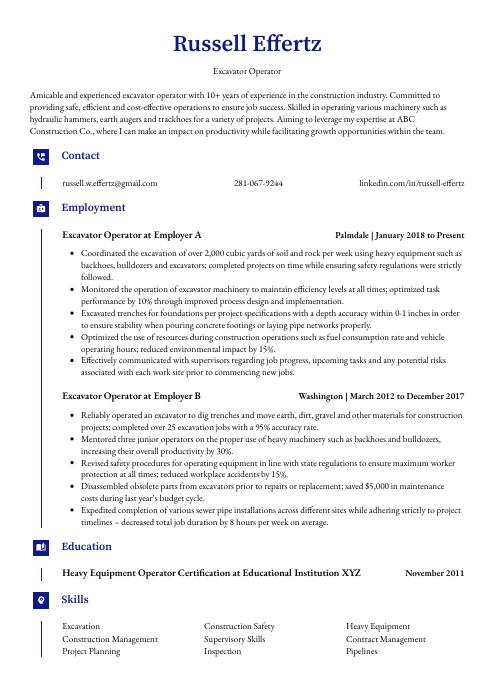 Gharial
Gharial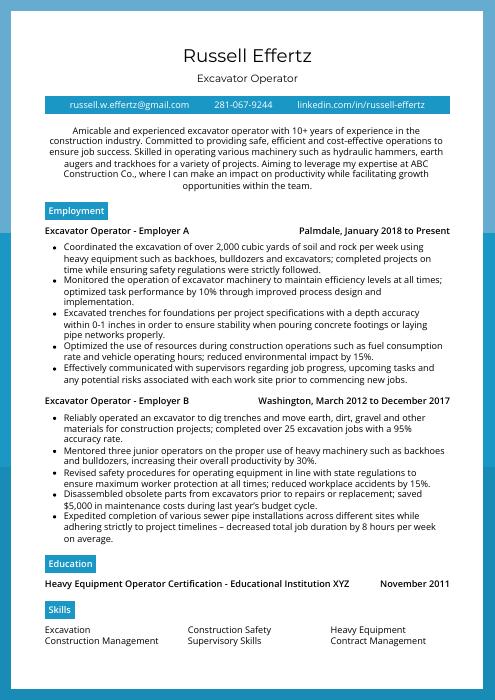 Rhea
Rhea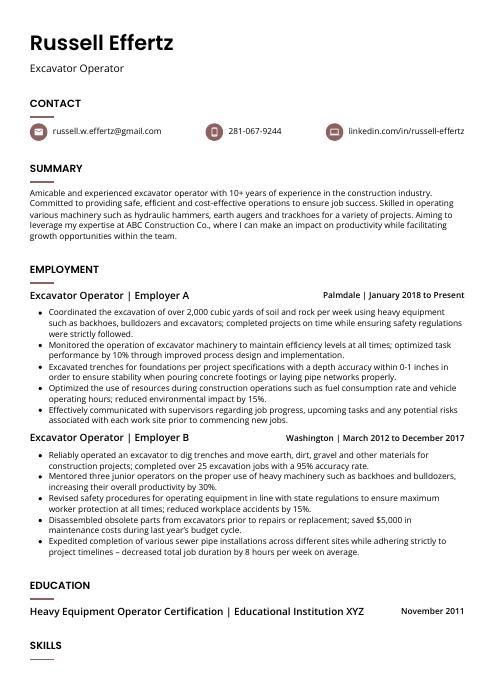 Fossa
Fossa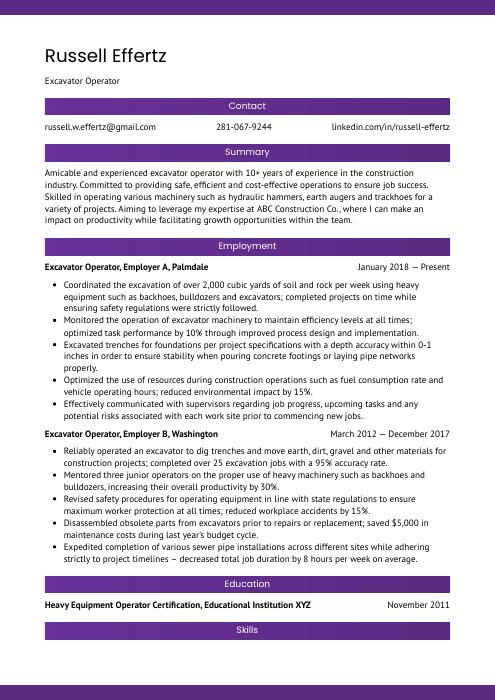 Jerboa
Jerboa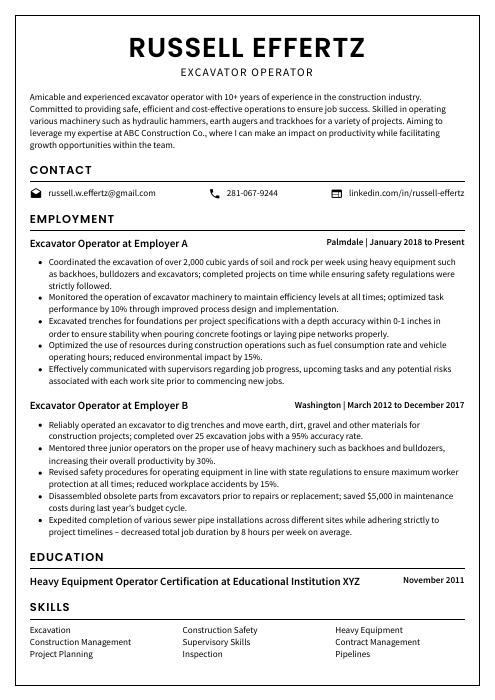 Cormorant
Cormorant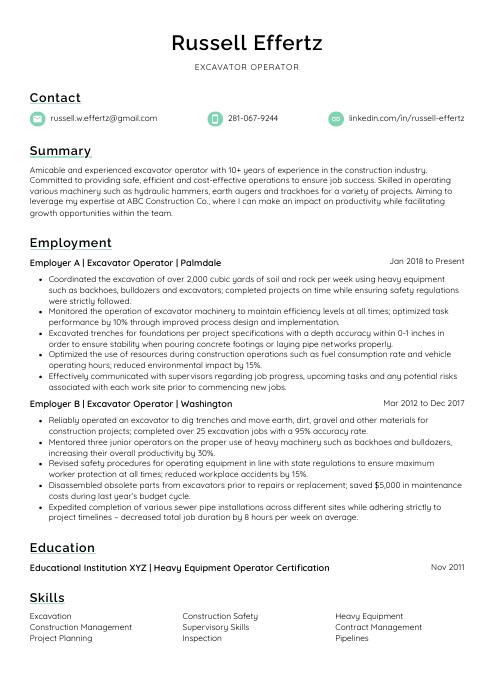 Lorikeet
Lorikeet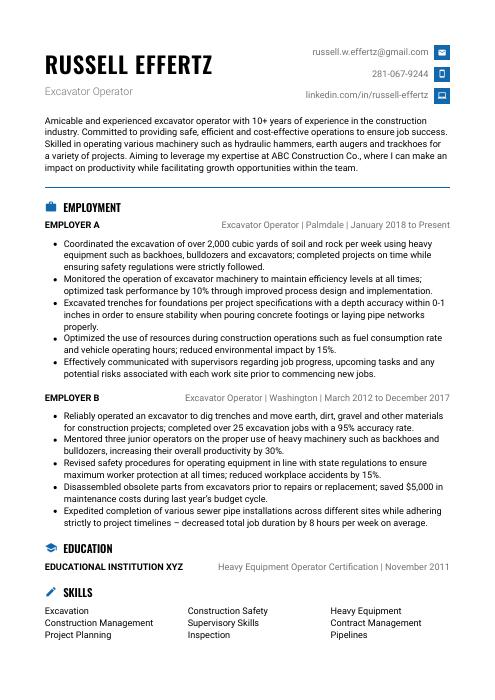 Echidna
Echidna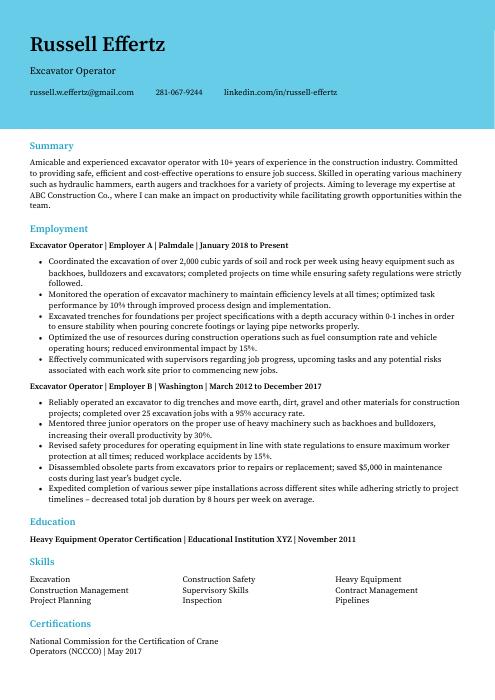 Dugong
Dugong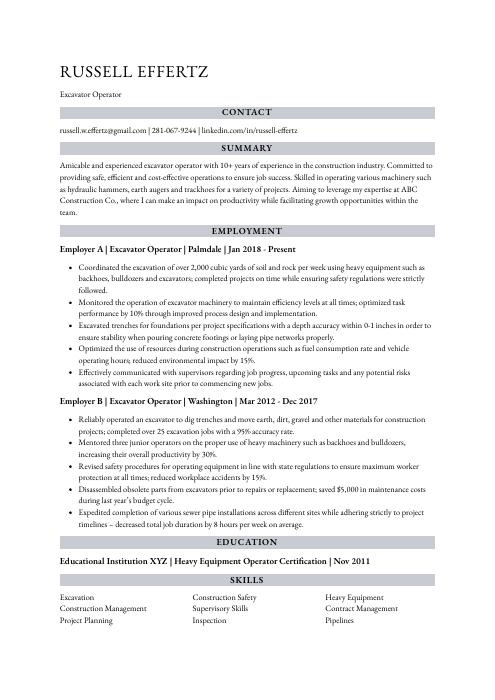 Numbat
Numbat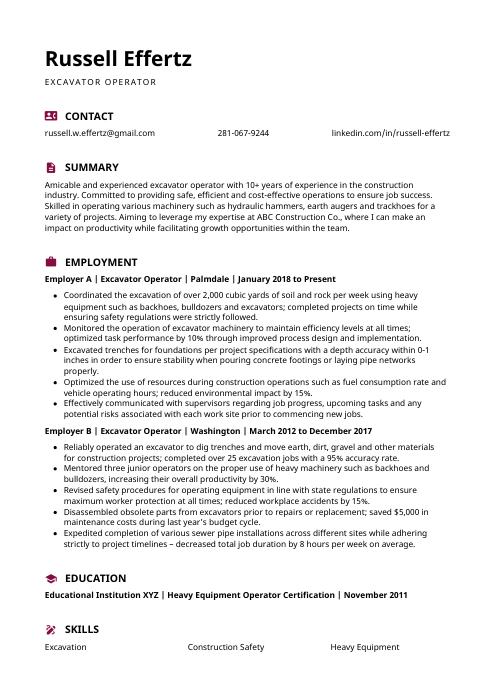 Hoopoe
Hoopoe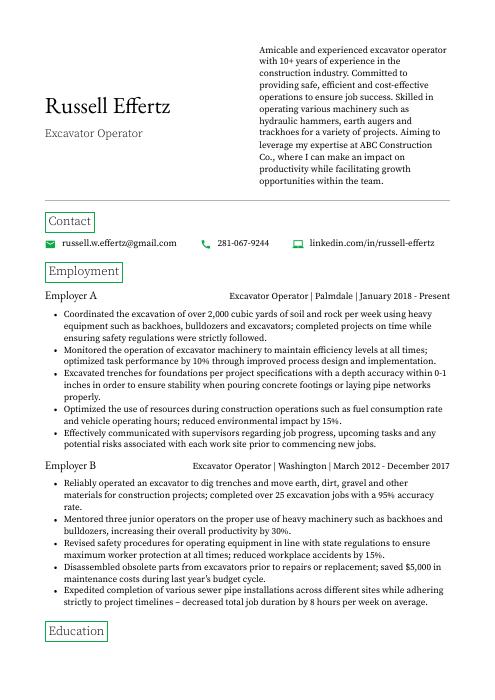 Quokka
Quokka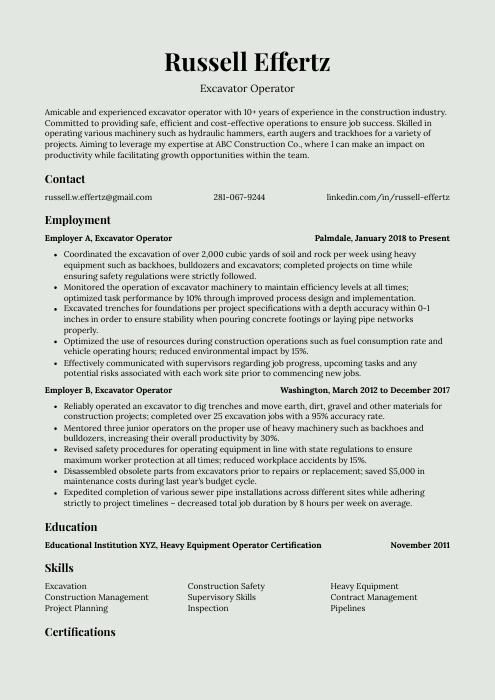 Saola
Saola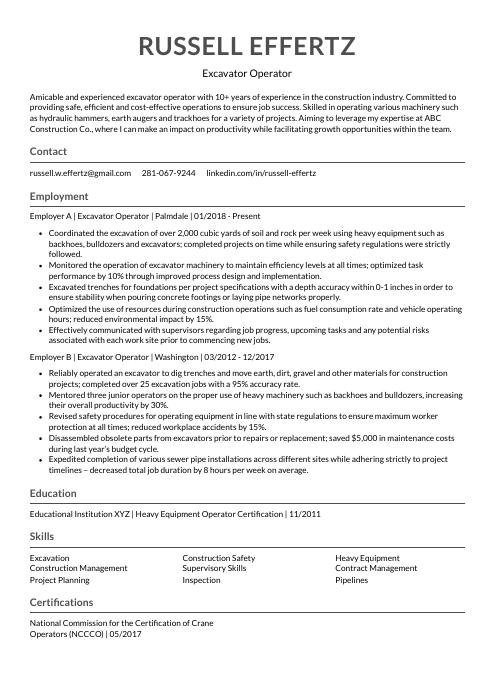 Indri
Indri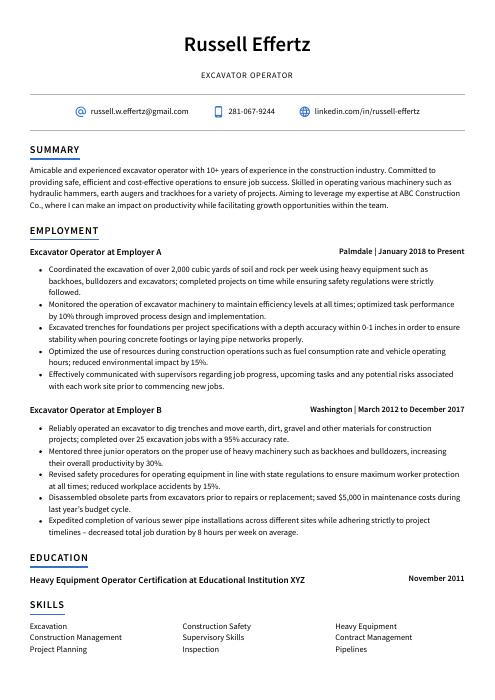 Axolotl
Axolotl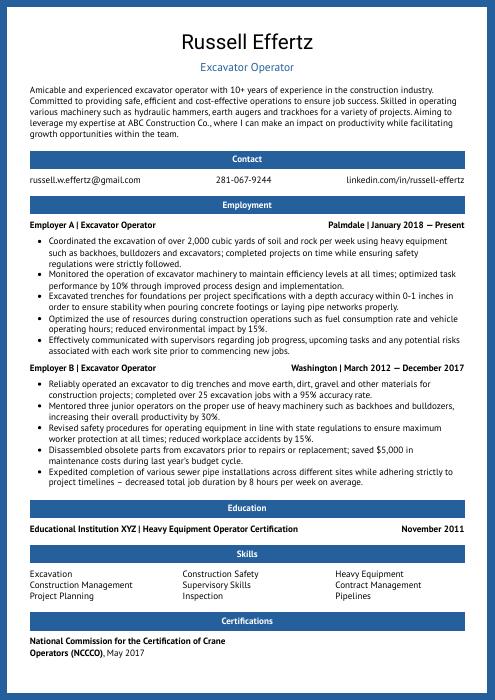 Ocelot
Ocelot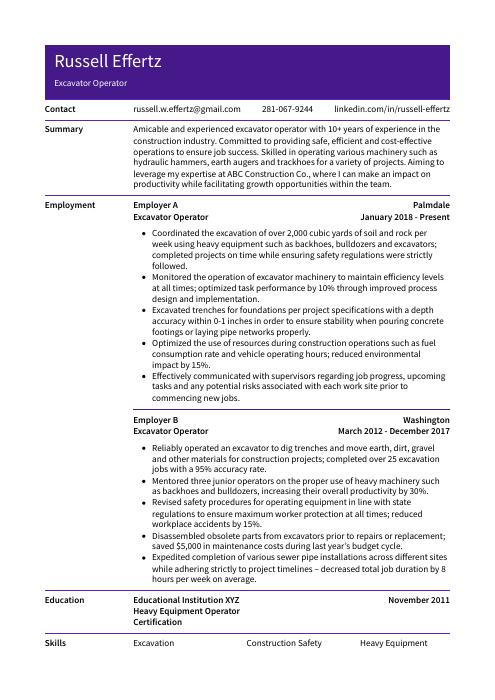 Pika
Pika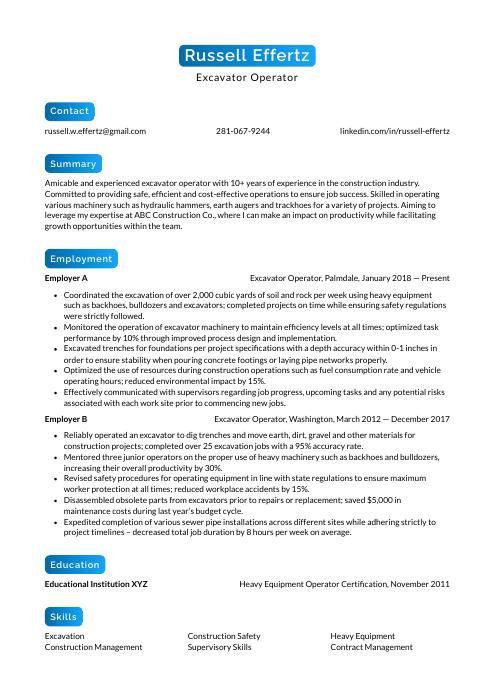 Kinkajou
Kinkajou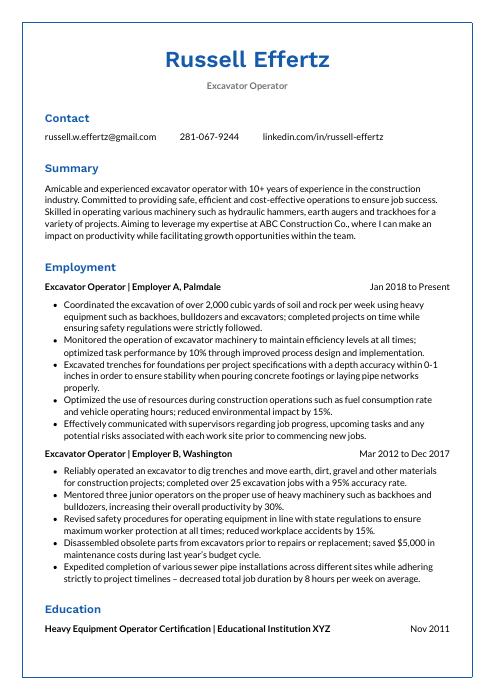 Markhor
Markhor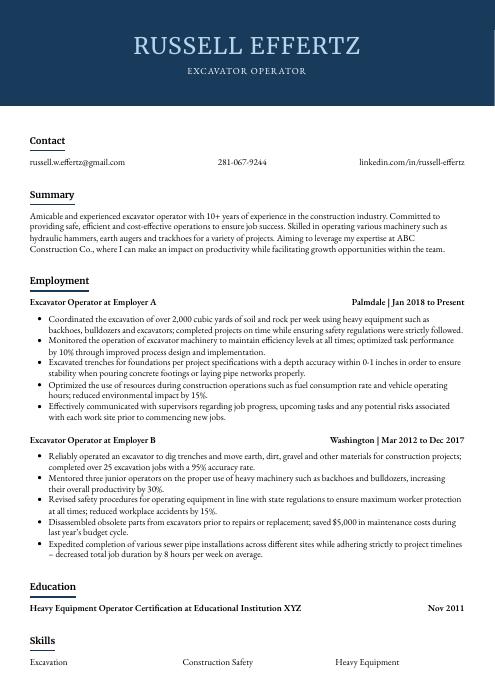 Bonobo
Bonobo Rezjumei
Rezjumei
